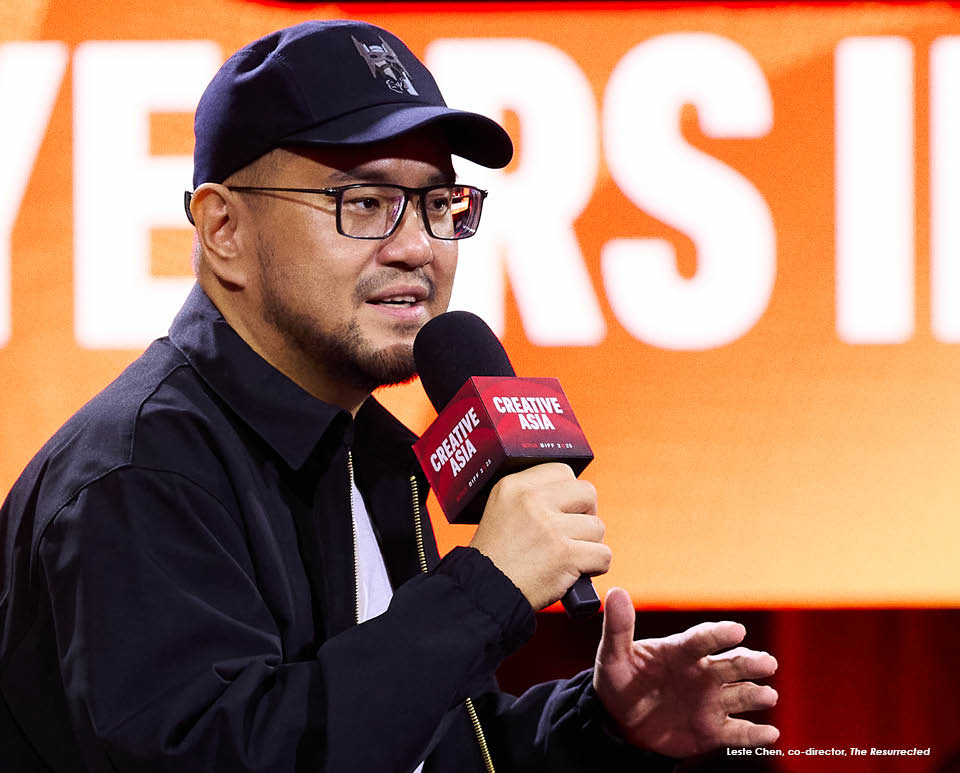
Taiwanese director Leste Chen trades in big ideas for new Netflix series, The Resurrected, about two mothers who bond over shared determination for revenge. But he avoids political finger- pointing, says Patrick Frater
Leste Chen and Hsu Chao-jen, two of Taiwan’s leading directors and frequent collaborators, reunite to deliver a glossy, dark and contemporary take on revenge, romance and superstition in new Netflix series, The Resurrected. In an understated way, the show also critiques contemporary politics in Southeast Asia. Two of the series’ nine episodes debuted in September in the On Screen section of the Busan International Film Festival (BIFF). Netflix debuts the remaining episodes globally on 9 October.
The Resurrected involves two mothers who bond over a shared hatred. Their daughters have both been victims of a notorious online scammer and, when the man is executed, the women seek revenge by employing a voodoo master to bring him back to life for a week. Their plan is to make the man’s little remaining ‘life’ hell.
“In my twenties, I was a very angry young man. For some reason, I wanted unspecific revenge,” Chen says. He has subsequently gone on to have a successful career in both film and TV and on both sides of the Taiwan Strait. He came up with the concept for The Resurrected some 20 years ago. “I needed to use this powerful emotion as a starting point for something,” he says.
The scenario creates meaty roles for two of the most established Chinese-speaking actresses – Taiwan’s Shu Qi and Malaysia’s Lee Sinje. “We only had three episodes written at the time Shu Qi joined. One personality is stronger than the other and initially we thought Shu Qi should be the more aggressive, dynamic character who is obsessed with revenge. But after reading those early episodes Shu Qi said she had never portrayed a housewife and would prefer to try the more timid role,” Chen says.
“As we completed writing the following episodes, we considered other actresses and approached Lee Sinje, who brings a careful and precise approach to the role. Hsu and I were very happy ...
Taiwanese director Leste Chen trades in big ideas for new Netflix series, The Resurrected, about two mothers who bond over shared determination for revenge. But he avoids political finger- pointing, says Patrick Frater
Leste Chen and Hsu Chao-jen, two of Taiwan’s leading directors and frequent collaborators, reunite to deliver a glossy, dark and contemporary take on revenge, romance and superstition in new Netflix series, The Resurrected. In an understated way, the show also critiques contemporary politics in Southeast Asia. Two of the series’ nine episodes debuted in September in the On Screen section of the Busan International Film Festival (BIFF). Netflix debuts the remaining episodes globally on 9 October.
The Resurrected involves two mothers who bond over a shared hatred. Their daughters have both been victims of a notorious online scammer and, when the man is executed, the women seek revenge by employing a voodoo master to bring him back to life for a week. Their plan is to make the man’s little remaining ‘life’ hell.
“In my twenties, I was a very angry young man. For some reason, I wanted unspecific revenge,” Chen says. He has subsequently gone on to have a successful career in both film and TV and on both sides of the Taiwan Strait. He came up with the concept for The Resurrected some 20 years ago. “I needed to use this powerful emotion as a starting point for something,” he says.
The scenario creates meaty roles for two of the most established Chinese-speaking actresses – Taiwan’s Shu Qi and Malaysia’s Lee Sinje. “We only had three episodes written at the time Shu Qi joined. One personality is stronger than the other and initially we thought Shu Qi should be the more aggressive, dynamic character who is obsessed with revenge. But after reading those early episodes Shu Qi said she had never portrayed a housewife and would prefer to try the more timid role,” Chen says.
“As we completed writing the following episodes, we considered other actresses and approached Lee Sinje, who brings a careful and precise approach to the role. Hsu and I were very happy with their chemistry.”
Having worked together previously, the co-directors made a well-oiled team with heavily overlapping roles. Rather than alternating, they shared directing duties on each episode and were both always on set. Before going into production, Chen would take the lead on script development (in association with other credited writers Shen Yang, Yi Shuai-jie and Luo Hsiao-rui) and focus on elements involving confrontation, while Hsu focused on the emotional aspects.
The directing pair say that their multi-person screenwriting effort did not amount to a U.S.-style writers’ room and that the role of ‘showrunner’ does not formally exist in Taiwan’s production industry. But they told ContentAsia that they expect it to do so as the island’s industry emerges as a regional hub for long-form entertainment.
As international streamers become dominant players in Asia, they bring other changes to the working environment.
Chen and Hsu appear to enjoy the creative freedom streaming affords. “Typically, with filmmaking, you focus on a single genre at a time, but a TV series can accommodate several different genres and characters. There are some big plot twists coming from episode three onwards,” Chen says.
“In the past, we’d have to prepare the whole script before we pitched to other broadcasters or platforms. But when we pitched to Netflix, we focused on the story, what kind of investment we might need and our production plan. We’d start with creating the show’s bible. Only once we had that and Netflix had embraced it did we start scripting episode by episode.”
The series trades in several big ideas, including revenge, the death penalty, motherhood and prevailing East Asian superstitions such as resurrection, karmic justice and the existence of an afterlife. But it is also resolutely contemporary in describing online scams and casual, corrosive corruption.
In order to blend these elements, much of The Resurrected is set in the bustling fictional metropolis of Benkha, though little effort has been made to disguise the Thai capital Bangkok or real locations within it.
“Bangkok is very lively with a mixture of locals and expats. And it is a great environment for production. This was my third time shooting there. But more than those practical aspects, this series covers many different topics and creates many dramatic confrontations and tensions that don’t only belong to Bangkok... [so] we chose to set it in a fictional city,” Chen explains.
Thai authorities have little tolerance for overseas film and TV productions that could tarnish the image they like to project in service of the country’s tourism industry. In recent months they have been embarrassed by organised crimes involving online fraud and human trafficking that were allegedly facilitated in or through Thailand.
Chen sidesteps discussion of those incidents and reframes the choice of the Benkha setting as part of Netflix’s effort to make content that is both local and has international appeal.
“Streaming platforms carry stories from around the world, with local contexts and local stories. But setting The Resurrected in a fictional city meant we could avoid restrictions and avoid projecting our imaginations about Bangkok onto Bangkok itself. We were able to talk about these [difficult] subjects without having to deal in the real world.”































